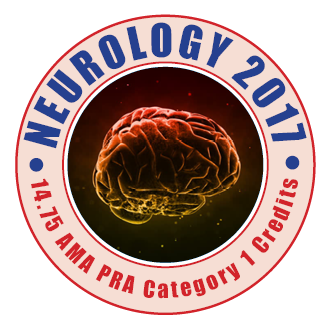
Anthony E Kline
University of Pittsburgh, USA
Title: Aripiprazole does not attenuate the benefits of environmental enrichment after experimental brain trauma
Biography
Biography: Anthony E Kline
Abstract
Introduction: The typical antipsychotic drug (APD) haloperidol (HAL), a D2 receptor antagonist, has been shown to impede functional outcome after experimental traumatic brain injury (TBI). Furthermore, the deleterious effects persist for up to 3 months after drug withdrawal. Moreover, a recent study showed that HAL reduced the effectiveness of environmental enrichment (EE), a preclinical model of neurorehabilitation. Because agitation is common after TBI, patients are provided APDs so that they can be safely managed. However, many patients in rehabilitation will only experience agitation occasionally and thus will receive APDs intermittently.
Hypotheses: Aripiprazole (ARIP), a partial D2 receptor agonist, will not impair recovery or reduce the effectiveness of EE regardless of whether administered once every day (i.e., chronic agitation) or once every other day (occasional agitation).
Methods: Anesthetized adult male rats received a cortical impact of moderate severity or sham injury and were then randomly assigned to EE or standard (STD) housing. Treatments with ARIP (0.1 mg/kg; i.p.) or vehicle (VEH; 1.0 mL/kg; i.p.) began 24 hr after injury and continued once daily for 19 days, or once every other day for the same period. Motor and cognitive outcome were assessed on post-operative days 1-5 and 14-19, respectively.
Results: Motor and cognitive function was significantly improved in the TBI+EE+VEH vs. TBI+STD+VEH group (p<0.05). Moreover, the TBI+EE+ARIP groups, regardless of dosing regimen, performed significantly better on all endpoints relative to the TBI+STD+VEH controls (p<0.05), but did not differ from one another or from TBI+EE+VEH (p>0.05).
Conclusions: ARIP, unlike HAL, did not impair recovery or reduce the efficacy of EE, which supports the hypothesis.
Significance: ARIP is beneficial on its own and does not negate the benefits of rehabilitation (i.e., EE) and thus may be used to control TBI-induced agitation and aggression without compromising recovery.

